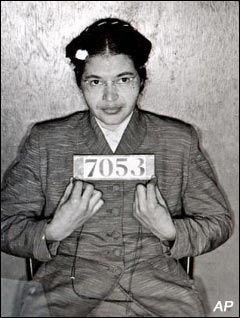Rosa Parks Dies at 92
 Rosa parks died on Monday night. She carried to her grave a name that was synonymous with the Civil Rights movement; a name perhaps eclipsed only by the name of the Rev. Dr. Martin Luther King, Jr. himself.
Rosa parks died on Monday night. She carried to her grave a name that was synonymous with the Civil Rights movement; a name perhaps eclipsed only by the name of the Rev. Dr. Martin Luther King, Jr. himself.When Rosa Parks refused to give up her seat to a white man on a Birmingham, Alabama, bus on December 1, 1955, she was not simply resting her feet. While her feet may, indeed, have been tired that day, it was her heart that was truly heavy and weary.
"Our mistreatment was just not right, and I was tired of it," she wrote years later.
On December 5 she was fined $14 and put on trial. Black Montgomery, including a young pastor, Martin Luther King Jr., organized a boycott of the city bus system, a boycott that would not end until late December the following year.
That year, 1956, would first find the Montgomery City Council voting to reaffirm their commitment to segregated seating on city buses. Soon after, a Federal Court, and then the U.S. Supreme Court, ruled that the segregation policy was in violation of the Constitution. On December 20, 1956, Federal injunctions were served on the city, enforcing the judicial rulings. The boycott ended the following day. A small, but historically significant, victory had been won.
In 1957 Parks and her husband moved to Detroit, Michigan. In 1963 she participated in the March on Washington where Dr. King delivered his "I have a dream..." speech.
In 1965 she began working as an administrative assistant to U.S. Representative John Conyers, D-Mich, a position she would hold for over 20 years.
In 1994 Parks published her memoirs, "Quiet Strength." Two years later she is attacked and beaten in her home by a black man looking for money. He did not know at the time who it was he had assaulted.
Afterwards, Park wrote, "I pray for this young man and the conditions in our country that have made him this way."
In 1996 she received the highest U.S. civilian honor, the Presidential Medal of Freedom.
Not to be outdone, in 1999, the U. S. Congress voted to present her with the Congressional Gold Medal of Honor as well.
Rosa Parks was quiet and gentle by nature. But she was stubborn, too. Once she had made up her mind that she was no longer going to accept being a second-class citizen of a country that guaranteed her equality under the law, she sat down on that seat on that Montgomery, Alabama, bus and never left it again.
The forces of bigotry and segregation tried their hardest to get her to stand up and go away but, in the end, it was not the world that caused Rosa Parks to move.....it was Rosa Parks who moved the world.


<< Home